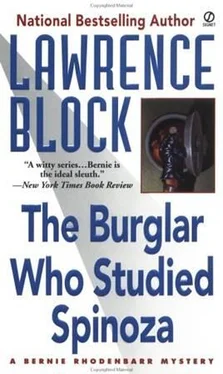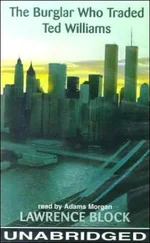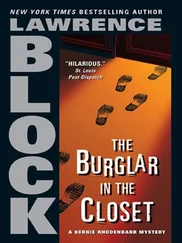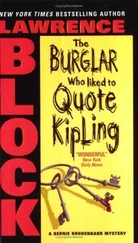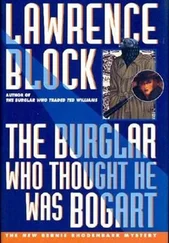A hush went over the room. It was, all things considered, one of your better hushes.
"That was a clue from my subconscious," I said, "but it took me a while to put it together. No one with inside information could have been the Third Burglar, because then he'd have known not to expect the Colcannons that night. And for someone to have dropped in through the skylight just by chance and then hanging around to commit homicide-well, it seemed to be stretching coincidence pretty thin. But my subconscious was trying to tell me something, and ultimately I managed to piece it together. Whether or not Shakespeare meant the Third Murderer to be Macbeth, the Third Burglar was Herbert Franklin Colcannon."
He was on his feet. "You're crazy," he said. "You're a raving maniac. Are you trying to say I staged a burglary of my own house? That I stole this nonexistent coin from myself?"
"No."
"Then-"
"There was no third burglary," I said. "Rabbit and Harlan stole everything they could find, and I took the three items from your safe, and that's as much burglary as you had that night. There was no third burglary and there was no Third Burglar, and there was nobody hanging around to hit you over the head and tie you up. You killed your own wife."
For a moment no one said anything. Then Colcannon told them that I was out of my mind. "Why are we listening to him?" he demanded. "This man is a self-confessed burglar and we're sitting here while he hands around accusations of larceny and homicide. I don't know about the rest of you, but I've had enough of this. I'm leaving."
"You'll miss the refreshments if you leave now."
His nostrils flared and he stepped away from his seat. Then a hand took him by the elbow and he spun around to meet the eyes of Ray Kirschmann.
"Easy," Ray told him. "Whyn't we have a listen to what Bern there has to say? Maybe he'll come up with somethin' interestin'."
"Take your hand off me," Colcannon barked. His bark was less reminiscent of a Bouvier than, say, a mini-poodle. "Who do you think you are?"
"I think I'm a cop," Ray said agreeably, "and Bern thinks you're a murderer, and when he has thoughts along those lines they tend to pan out. Long as he's got the ball, let's just see where he runs with it."
And where would that be? "Mr. Colcannon's right about one thing," I said. "I'm a burglar. More accurately, I'm a bookseller who's trying to break himself of the habit of burglary. But one thing I'm not is a policeman, and it's going to be the job of the police to put together a case against Colcannon for murdering his wife.
"But maybe I can tell them where to look. His finances wouldn't be a bad place to start. The Colcannons lived well and they owned a lot of valuable things, but the rich get into financial difficulties the same as the rest of us.
"One thing that made me suspicious was the emptiness of that wall safe when I opened it. One watch, one pair of earrings, one rare coin, plus a handful of papers-people who own wall safes generally utilize them more, especially people with attack dogs who believe their premises are impregnable. I made a few telephone calls yesterday, and I learned that Mr. Colcannon has been selling off some of the coins he's bought in recent years."
"That proves nothing," Colcannon said. "One's interest changes. One sells one article to buy another."
"Maybe, but I don't think so. I think you took a couple of major gambles recently-your safe contains some stock certificates that represent securities you've taken a heavy loss on. And I think you paid a damn sight more for the 1913 V-Nickel than the twenty grand Mr. Pitterman received for it. You probably couldn't afford that nickel when it came available, but you had to have it because you're an avaricious man, and unless Spinoza was off base, avarice is a species of madness, and not an endangered one, either.
"You bought the nickel, shelled out for it at a time when you were trying to raise cash to meet your other obligations. Then you took your dog to be bred-another damned expense, although it would pay off when Astrid had her pups-and you rushed back to New York rather than stay overnight in Pennsylvania, and maybe you and your wife had an argument at the theater or during dinner afterward. That's something the police can find out if they do a little legwork.
"It hardly matters. The two of you walked into your house to find the unmistakable evidence of a burglary. Maybe you'd been planning on selling various valuables that they'd walked off with. Maybe you were underinsured. You probably didn't ever think to raise the insurance coverage on your silver, hardly anybody does, and now the nice windfall you'd had during the sharp rise in silver was wiped out by thieves in the night.
"And maybe your wife made some smartass remark right about then, and maybe it was the last straw. Or did it just remind you that one of the few things remaining in your wall safe was an insurance policy on both your lives? If either of you died, the other collected half a million dollars. And there's a double indemnity clause for accidental death, and the companies consider murder an accident, although it's generally undertaken on purpose, which is a contradiction, don't you think? Maybe the first time you hit her was out of rage, and then the possibility of gain suggested itself to you. Maybe you took one look at the looted rooms of your house and saw instantly that the burglary would make a good smoke screen for murder. We probably won't know the answer to that one until you confess, and you probably will confess, Mr. Colcannon, because amateurs generally do. And you're an amateur. You're an absolute pro at avarice, sir, but you're an amateur at homicide."
I meant he'd most likely confess at the police station, not in front of the lot of us. But a shadow passed over his face right about then and I decided to shut up for a minute and give him room. Or rope, if you like.
His lip quivered. Then a muscle worked in his temple. "I didn't mean to kill her," he said.
I looked at Ray and Ray looked at me, and a smile blossomed on Ray's lips.
"I hit her once. It was an accident, really. She was railing at me, nagging me. She could be such a shrew. She'd married me for my money, of course. That was no secret. But now that money was tight-" He sighed. "I swung at her. I could never have done that if the dog had been around. The bitch would have taken my arm off. I swung and she fell and she must have hit her head on something when she reached the floor."
It was nice embroidery. I'd seen those pictures, and the woman had been systematically beaten to death, but let Colcannon put the best face on it for the time being. This was the opening wedge. Later on they'd crack him like a coconut.
"Then I tried to find her pulse and she was dead," he went on, "and I thought that my life was over, too, and then I thought, well, let the burglars take the blame for this one. So I tied her up and I struck myself over the head, it was hard to make myself do that hard enough to inflict damage but I steeled myself, and then after I'd set the stage I called the police. I thought they'd question me and break me down, but they took one look around and knew the house had been looted by burglars, and that evidently satisfied them."
Ray rolled his eyes at the ceiling. Some members of the department, I suspected, were going to hear about this one.
"But I never killed Abel Crowe!" Colcannon was bristling suddenly with righteous indignation. "That's what all this was supposed to be about, isn't it? The murder of a receiver of stolen goods? I never met Abel Crowe, I never even heard of Abel Crowe, and I certainly didn't kill him."
"No," I agreed. "You didn't."
"I didn't know he had my coin. I thought you had my coin."
Читать дальше
